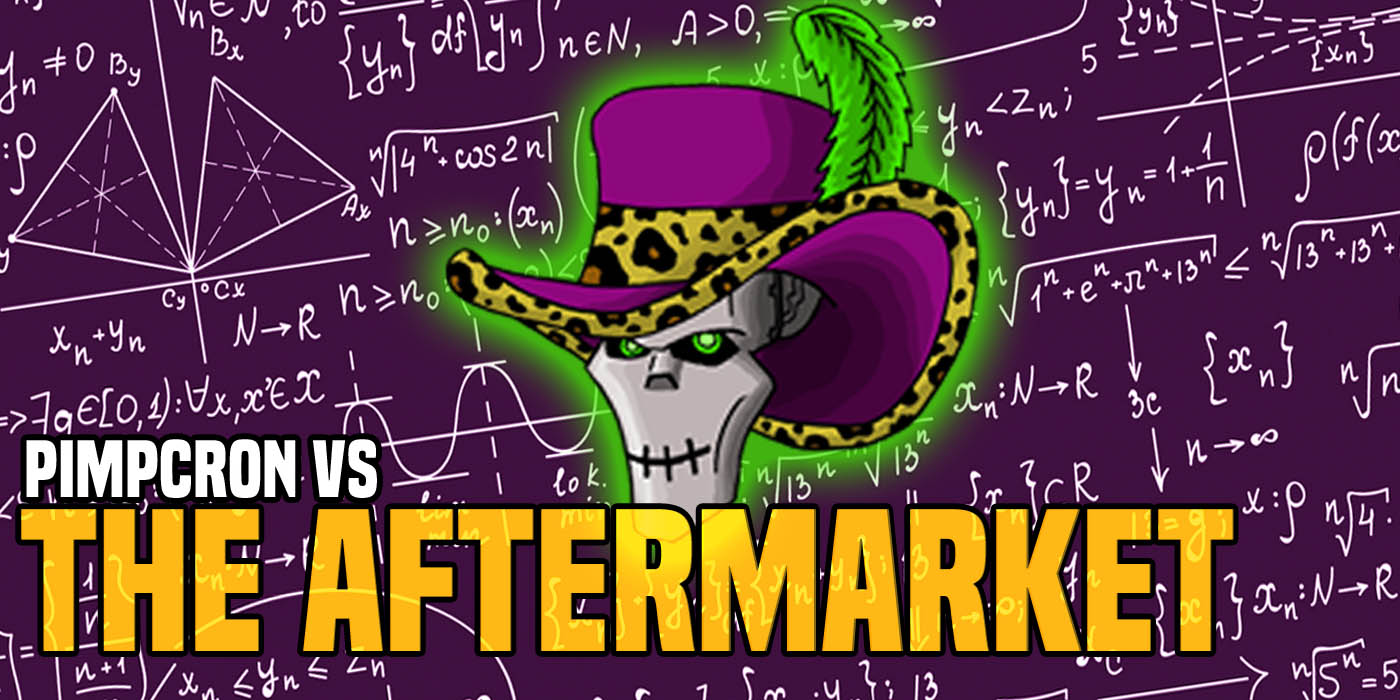Pimpcron: The Dangers of the Aftermarket


Here’s how GW is fighting back.
Well hello there, I didn’t hear you walk in. This is kind of awkward, I certainly wouldn’t be wearing this tuxedo and unicorn head if I knew you’d be dropping by. If you would please use discretion on this matter when talking to your friends, I’d appreciate it. In payment for your open-mindedness I will share my insights into the world of Warhammer resale and half of my pickle and cream cheese sandwich.
Services > Products
Put on your helmets, I’m about to drop knowledge. I know at least a portion of you readers finished primary school, so I won’t beat this idea to death but trust me, there is a point. Services are a much better business model than making and selling products, and here’s why. Every single product you sell is technically hurting your future sales, while providing a service doesn’t really impact the likelihood of that same customer needing you in the future. Many service industries have built-in demand, such as grass cutting, where the customer constantly needs your service. The fact that they need your service is not a sign that you did it wrong the first time, you are combatting a constant need rather trying to fix something broken.
Ya know, your guess is as good as mine on this pic.
We know that only a portion of the population will ever play a tabletop game. Then a smaller portion of them will ever try a miniatures tabletop game. An even smaller subset will ever try Warhammer in particular over other games. So Games Workshop doesn’t have a widely appealing and widely selling product like Cadbury or Coca Cola. Their product really can’t be sold across large swathes of the population.
Each Sale is a Coffin Nail
Every single time Games Workshop sells a model kit, they are risking shooting their selves in the foot. Ok, think of it like this, each customer has a set number of slots for model kits. It might be twenty model kits, it might a hundred, each customer is different. But most people don’t buy fifteen Devastator squads, for example. So there is only a set number of each box set they will buy. Every time GW sells them a model kit they need, that customer’s slot is filled for that kit. Never to be purchased again in some cases. That is bad because the dollar they made this week off that kit is now exhausted for that customer and will never be sold again. Finite source of money.
“What! Sir?! Sir?! Here’s your parking ticket!”
Or a real nightmare scenario is when a customer decides to close all their model kit slots (aka get out of the hobby) because now the possible future sales to that customer is now 0. But to make matters worse, the guy rage quitting Warhammer sells the contents of his model kit slots to other plays. (gasp!) Other possible customers who would ultimately buy from GW if there was no such thing as a secondary market.
The Secondary Market is a Killer
A business needs a constant flow of income to pay its employees and operate. So selling a product that doesn’t expire or go bad is a really bad concept. For instance, dairy farmers don’t have this issue. Nobody is going around buying old milk from estate auctions because that would be gross. I know this may sound dramatic but every time you sell a miniature to a friend or someone online, you’re literally taking that sale away from GW. Buy selling you models, they make potential competitors in the market of selling miniatures. What a weird thought huh? What if every time a plumber came to your house, they downloaded all of their knowledge and experience into your brain so you’d never need them again? Of course they wouldn’t do that, you’d know all their dirty secrets like how often they dress up as fancy unicorns.
A Race For The Cure
So there are only two ways to combat this if you were GW. Grow your fan base and rely on growth of new players, or give your models an expiration date. They seem to be doing a good job of growing their fan base in recent years so good on them. But they also have subtly been giving their miniatures an expiration date as well: making newer, better looking models or in some cases remaking older models. They aren’t requiring you to buy these new or reimagined models, but they know that most of us will buy new models if they look cool.
“It’s just a camera Benedict! It’s not a ghost!”
Their best idea for combatting resale is the Start Collecting boxes. What they end of up doing is giving you a decent discount on a box of models. These Start Collecting boxes are a good idea for them because they sell more product (several kits per STB, and it floods the market with unwanted units. For instance, Brayherd Shamans go for next to nothing because everyone gets them in the Start Collecting. But most people don’t have a use for more than 1 or 2 in their army. So GW gets to sell these Shaman, and ensuring that people that aim to profit off of reselling STB are getting punched in the loins.
All in all, I marvel at how strange this scenario is for product based businesses.
Do you think the secondary market is a disease or a Robin Hood?
Hey! This article is brought to you by my top-tier Patreon supporter Mike Cowley!
Thanks Michael, smooches!
 We’re on Podbean, Stitcher, iTunes, Spotify, and others!
We’re on Podbean, Stitcher, iTunes, Spotify, and others!
Pimpcron’s Narrative Wargaming Supplement
Free PDF version, full PDF version, or hardback version!










